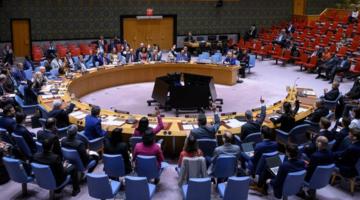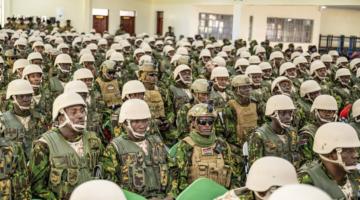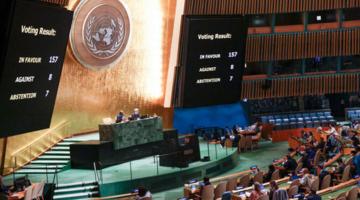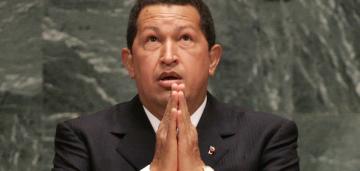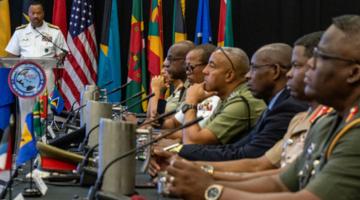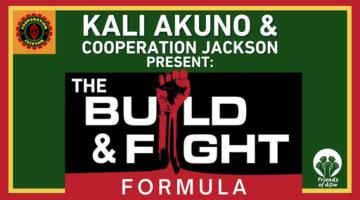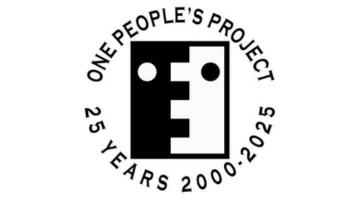People gather in central Tehran to protest against Israel’s wave of strikes on Iran on 13 June 2025 (Atta Kenare/AFP)
In practice, the UN Charter ensures that the world’s most powerful nations are free to wage war at will without UN intervention or even censure, as the US has time and again.
Before raining bombs and missiles on Korea, Iraq, Libya, and Syria, the US at least requested authorization from the UN Security Council (UNSC) in accordance with the UN Charter, sometimes getting it, sometimes not. This year it skipped that nicety altogether, bombing Iran without so much as a call to Secretary General Antonio Guterres. Israel didn’t bother to make its case either, knowing that the US had its back.
The US did send the Council a ridiculous explanation after the fact. It said it had to neutralize an Iranian nuclear threat and claimed its inherent right of self-defense and collective self-defense with its ally Israel, citing the Charter’s Article 51. However, Article 51 reads, “Nothing in the present Charter shall impair the inherent right of individual or collective self-defence if an armed attack occurs against a Member of the United Nations . . .”
Iran had not attacked the US or Israel, and there was no imminent nuclear threat because Iran has no nuclear weapons. The US and Israel have lots of nuclear weapons, which they tacitly claim as their inherent right, but God forbid that Iran should have one. They’re not part of the US/EU/NATO Axis of Domination, and besides, they nationalized their oil.
The US exercised brute force, then briefly tried to justify it with legalese pulled from the Charter instead of saying “We bombed Iran because we can.” Even Americans might find that crude.
Several UNSC members made some noise about the US and Israel’s violation of international law, as did Secretary-General Guterres, but the US veto kept them from passing so much as a resolution condemning it, as it always does.
Then, on September 27th, the UNSC reimposed sanctions on Iran for resuming nuclear enrichment after Trump, back in 2018, pulled out of the 2015 Iran nuclear deal. The US was free to renege on its commitments, being part of the US/EU/NATO Axis of Domination, but Iran was punished for responding in kind.
The sanctions were set to automatically “snapback” if Iran failed to comply, and the E3–the UK, France, and Germany–activated the snapback. Russia and China had inexplicably agreed to the snapback provision when the sanctions were imposed, and their delaying resolution couldn’t even get the 9 of 15 votes required to pass. Only Russia, China, Algeria, and Pakistan voted for it. The US, UK, France, Denmark, Greece, Panama, Sierra Leone, Slovenia, and Somalia voted against, so it didn’t even have to face vetoes by the US, UK, and France.
As we write this, the world expects the US and Israel to bomb Iran again any day without so much as a by-your- leave to the UNSC.
So is the Charter worth more than the paper it’s written on? Its promise to maintain peace could hardly have been a more monumental failure.
How was it supposed to work?
Representatives from 50 countries signed the Charter on June 26, 1945, as World War II was nearing its end, and Poland signed four months later. The Charter declared it unlawful for any nation to violate another’s sovereignty, meaning its borders and political independence. In other words, they made it a crime to start a war. Any nation that did was to be met with censure, sanctions, and, if all else failed, with multilateral force under UN command.
The UN Security Council would decide who had waged war and how to respond. It would be made of 15 members, ten rotating from five regional groups. The great powers who had won World War II, the US, UK, France, the Soviet Union, and the Republic of China (later replaced by the People’s Republic of China), were given permanent seats with veto power, meaning that the Council could never hold any of them responsible for starting a war, as the US has many times since 1945.
Why was such an agreement celebrated? Why did anyone ever expect it to guarantee world peace?
Why were the five great powers given permanent seats with veto power? The answer was of course realpolitik. They weren’t going to surrender their national interests to the will of a global majority, even as they signed a document guaranteeing the sovereign equality of nations. Stalin, understandably, wasn’t willing to subject the Soviet Union to the will of its ideological antagonists.
The US has most flagrantly violated the Charter by waging aggressive wars without UNSC approval. This is a short list of US wars with and without UNSC recognition since 1945:
Korean War, 1950-1953: UNSC Resolution 83, introduced by the US, passed in 1950, authorizing member states to provide assistance to South Korea to, it said, repel invasion by North Korea. A multilateral force including 22 nations was assembled under UN command, which was effectively US command, in accordance with the Charter. US and South Korean troops did most of the fighting.
The resolution passed because the Soviet Union was then boycotting the UNSC for refusing to give the permanent seat held by the Republic of China to the People’s Republic of China.
This was most fundamentally a US capitalist war to contain communism.
Vietnam War, 1955 to 1975. The US waged war on Vietnam without seeking UNSC authorization because it knew the Soviet Union would veto.
This was another US capitalist war to contain communism.
Gulf War, 1991: Resolution 678 authorized the use of "all necessary means" to ensure Iraq's withdrawal from Kuwait. The UNSC vote was 12 to 2 with one abstention. Cuba and Yemen voted no while China abstained.
It thus complied with procedure codified in the Charter, but it was essentially a NATO operation made possible by Yeltsin’s subservience to Washington after the collapse of the Soviet Union.
US invasion of Panama, 1989: The US invaded and overthrew the government of Panama without seeking UNSC authorization and vetoed a resolution condemning the invasion.
US invasion of Grenada, 1983: The US invaded and overthrew the socialist government of Grenada without seeking UNSC approval and vetoed a resolution condemning the invasion.
US/EU/NATO war in Yugoslavia, 1990s: During the 1990s, the UNSC passed nine resolutions authorizing the use of force in the former Yugoslavia to deliver humanitarian assistance, enforce a no-fly zone, establish safe areas and protect UN troops, implement the Dayton Peace Accords, and introduce civil administration and UN peacekeepers.
In 1999, NATO bombed Kosovo without UNSC authorization to stop what they said was Serbian ethnic cleansing of ethnic Albanians.
Russia introduced resolutions to condemn the NATO bombing as a flagrant violation of international law. Russia and China voted for them, but they failed to garner the 9 of 15 votes required to pass, so there was no need for US/UK/French vetoes.
US-led invasion of Iraq, 2003: The US sought UNSC authorization but failed to get it because France, Russia, and China opposed it. The US proceeded without authorization.
Intervention in Libya, 2011: The UNSC adopted Resolution 1973, authorizing a no-fly zone and "all necessary measures" to protect civilians during Libya’s civil war.
The US/NATO used the resolution as an excuse to bomb Libya relentlessly and use a proxy force to overthrow the government. Secretary of State Hillary Clinton ordered President Muammar Gaddafi’s assassination, saying “I want him dead,” and then “We came, we saw, he died.”
Russia and China abstained on Resolution 1973, thereby allowing it to pass, but then protested that the NATO-led coalition had overstepped their mandate and contributed to Libya's descent into chaos.
Syrian Civil War, 2014-2024: The US and UK repeatedly sought UNSC authorization to wage war against Syria’s government, arguing Responsibility to Protect, but faced a Russian veto every time. The US, UK, and other NATO nations bombed Syria nevertheless.
US and Israeli Wars on Iran, 2025: As noted at the outset, neither the US nor Israel sought UNSC authorization to attack Iran, but did so anyway and are expected to again soon.
Imperialism is the common thread in this list of post-WWII US wars. Only 2 of 10, the Korean and Gulf Wars, were approved by the UNSC, and the Korean War was, again, a war to contain communism, not aggression. The Gulf War was, again, a NATO project launched in the wake of the Soviet Union’s collapse, when Russia was not resisting on the Council.
So, again, is the UN Charter worth the paper it’s written on? Will it ever guarantee its central, undeniably laudable goal, the sovereign equality of nations with the same rights and obligations, regardless of their size, power, or economic status? Or is it simply a distraction from anti-imperialist struggle?
That’s arguable, but the UN is still the only global forum offering any semblance of the rule of law in matters of war and peace, and the only place where every nation has a voice, however small.
Nations are considered sovereign when the UN recognizes them as member states, as is most painfully evidenced by the ongoing genocide of the Palestinian people. What would constitute national sovereignty without the UN system?
Countries including Algeria, Angola, Bolivia, Cuba, China, North Korea, Eritrea, Iran, Laos, Nicaragua, Russia, and Venezuela—all of which have been victims of aggressive war—have joined in a coalition called the “Group of Friends in Defense of the Charter of the United Nations” rather than walking away from the whole system.
A number of UN experts, including Albert de Zayas, call for reforming, rather than scrapping, the Charter.
One proposed reform is to increase the number of permanent members of the Security Council beyond the five victors in WWII and to require more than one veto to prevent passage of Security Council resolutions. Another is to give more power to the General Assembly which has grown to represent the entire world as a result of the post-WWII anti-colonial struggle.
To amend the Charter, two-thirds of the UN General Assembly members must adopt and then ratify a proposal, including all five permanent members of the Security Council, in accordance with their national ratification processes. These steps are outlined in Article 108 of the Charter and have only been successfully applied three times since 1945, most notably to increase the Security Council's non-permanent members.
Is the power of the five permanent members an insurmountable challenge? It’s hard to think not, but one thing is certain: The UN system has never, not even once, fulfilled its stated mission of preventing aggressive war, and without reform, it never will.
Ann Garrison is a Black Agenda Report Contributing Editor based in the San Francisco Bay Area. In 2014, she received the Victoire Ingabire Umuhoza Democracy and Peace Prize for her reporting on conflict in the African Great Lakes region. She can be reached at ann@anngarrison.com. You can help support her work on Patreon.
Daniel Kovalik is a lawyer focusing particularly on human rights and a prolific author. He taught International Human Rights Law at the University of Pittsburgh from 2012-2023. His most recent books are "The Case for Palestine: Why it Matters and Why You Should Care," and "Syria: Anatomy of a Regime Change."


